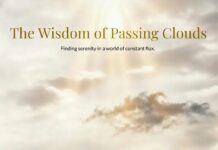Hello, everyone!
Welcome to this episode of the podcast provided by the Buddhas’ Practice Incorporated of Australia.
Today, we will discuss a crucial topic: how to ensure our words and actions truly bring benefit to ourselves and others, rather than being useless or even harmful.
1. Think Before You Act
When we can truly manage to “think before we speak,” we will suddenly realize that many things said in this world are completely superfluous and useless. When these useless thoughts arise, why don’t we simply not follow them? Because once we do, they become a burden. Many people, throughout their lives, measure everything by what is “useful” or “beneficial,” even seeing harmful acts as beneficial to themselves. However, this is often a mistaken judgment. Most of these acts are harmful in reality, simply because we have accumulated so much ignorance and wrong conditioning in the past.
So, how should we conduct ourselves? The key is to establish a clear set of rules for ourselves. When a thought emerges, we must clearly recognize that ninety-nine percent of them are not good thoughts. At this point, we can choose to “follow” or “not follow.”
2. The Criterion for Judgment
The core criterion for judgment is: is this word or action “in accordance with the benefit of all beings”?
If it is in accordance with the benefit of all beings and can benefit them, then we should speak and act. Conversely, if it is not in accordance with the benefit of all beings, or even runs counter to it, then we should not speak, not act, and not even think about it.
This seemingly simple point can, in fact, be applied throughout the “Ten Virtues.”
You see, if you act in accordance with the benefit of all beings, you will not kill, because killing is not beneficial to them. You will not steal or lie, because it brings them no benefit. You will not speak frivolous words, because that brings them no benefit. All words that are not beneficial to others are unwholesome words. If it is beneficial, your speech should always be wholesome. If it is harmful to them, even a seemingly kind word can be a harsh one. All of this boils down to whether we take “benefiting others” as our guiding principle.
Furthermore, people always want to know many things. However, ninety-nine percent of what we know is useless to us, and even harmful. Why harmful? Because it becomes data for your delusions.Therefore, knowing too much is harmful and not beneficial.
So, how can we discern whether a thought or a desire to know something is beneficial or harmful to ourselves? We must deeply contemplate: what does it nourish? Does it nourish your “wisdom and merit” or your “afflictions and delusions”? Is it “delusional data” or “meritorious data”?
Is it “wisdom data” or “data that leads you to misfortune”?
We must grasp this core principle!
At the very least, this will allow us to truly benefit ourselves. Just think, if we spend our entire lives, and our words and actions continuously harm ourselves, ultimately pushing us into an abyss, whose fault is that? Isn’t it all caused by our own hands?
3. Conclusion
Therefore, when you think something is “beneficial” or “not beneficial,” please think one layer deeper: what is it truly nourishing?
Through this awareness and practice, we can truly transform ourselves, allowing every thought, every word, and every action to become a resource for the benefit of ourselves and all beings.
Thank you for listening!





